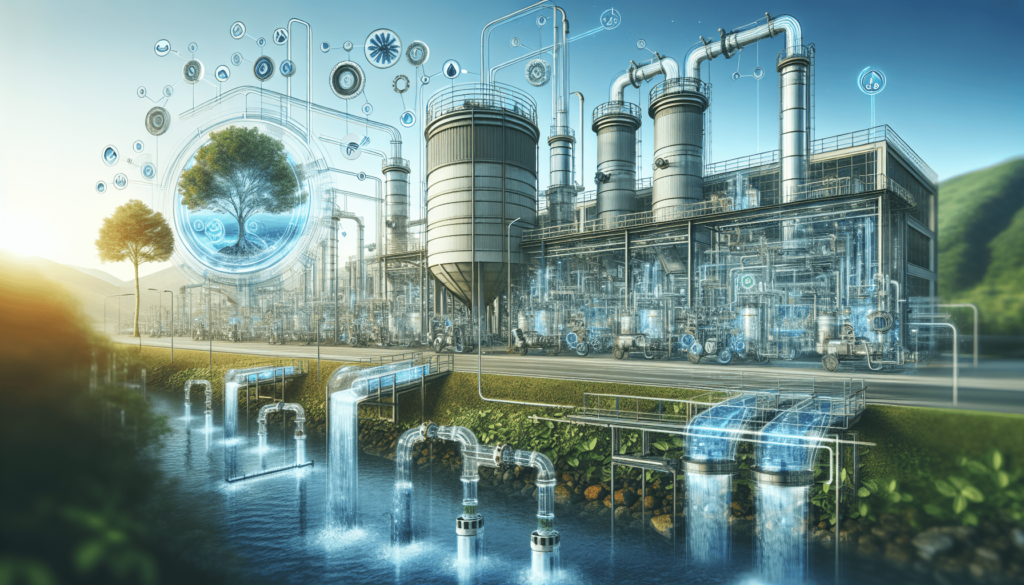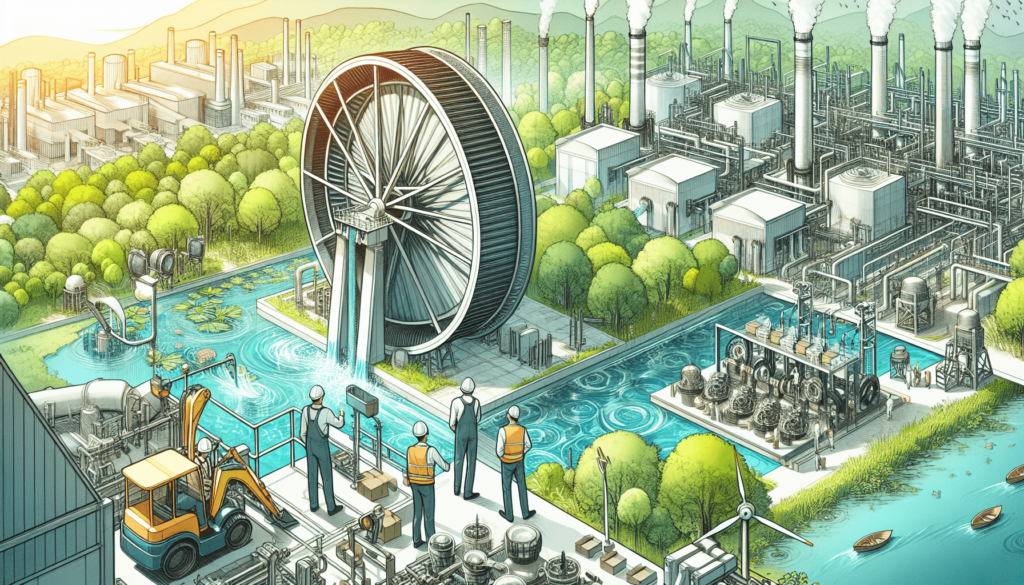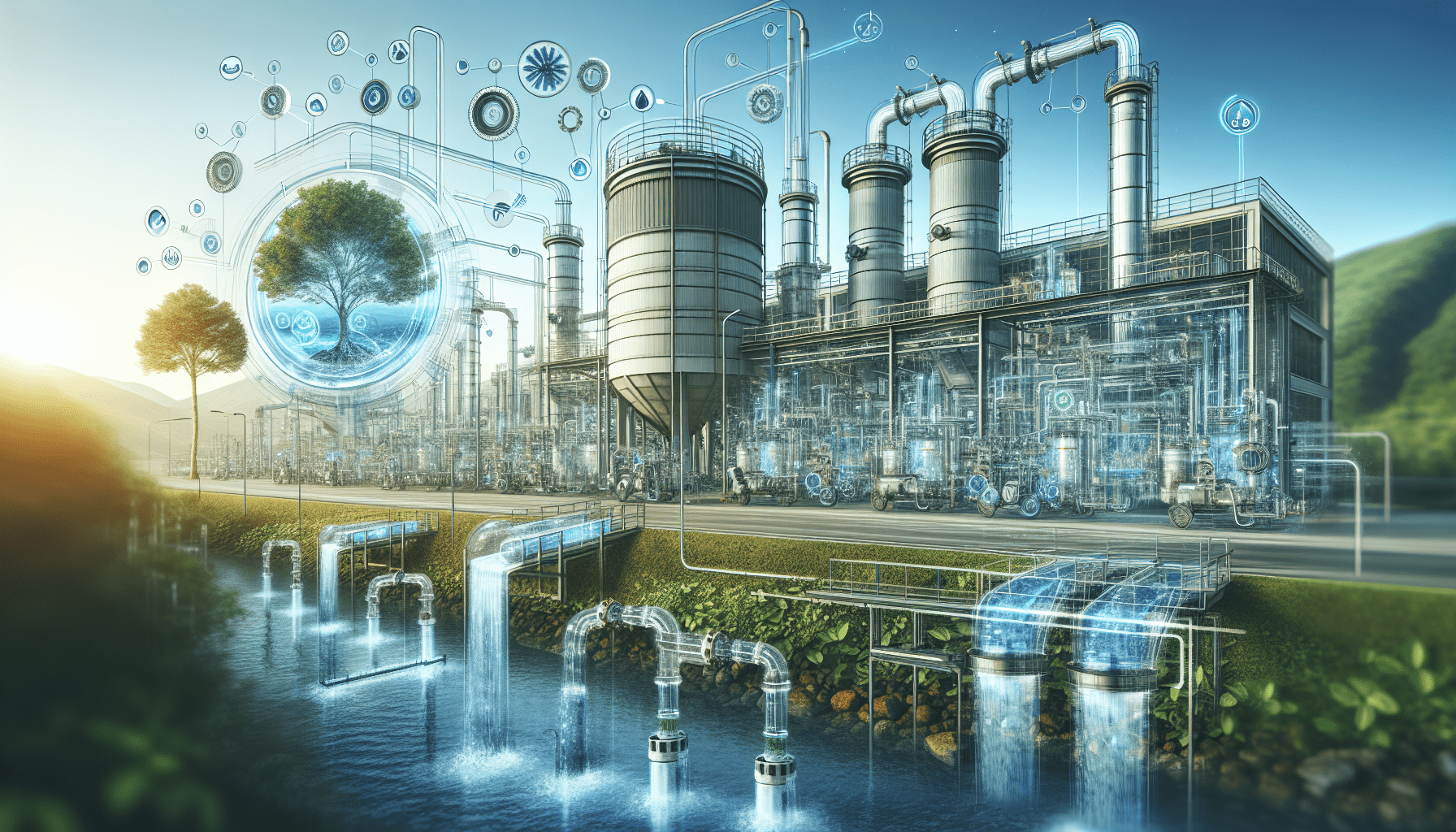In today’s world, where concerns about finite resources and environmental impact are at the forefront, industries must prioritize sustainable practices, especially when it comes to water usage. The importance of sustainable water usage in industry cannot be overstated. With water scarcity becoming an increasingly prevalent issue, it is crucial for businesses to implement strategies that minimize water waste and promote efficient usage. This article explores the significance of sustainable water usage in industry and highlights the benefits it brings, not only to the environment but also to the long-term viability and reputation of businesses.
Reducing Water Scarcity
Water scarcity is a pressing global issue that affects various industries in different ways. The scarcity of freshwater resources not only poses environmental challenges but also poses risks to economic growth and social well-being. It is crucial for industries to recognize the impact of water scarcity and take sustainable water usage practices seriously.
Impact of water scarcity on industries
Water scarcity has far-reaching implications for industries across various sectors. In agricultural industries, limited water resources can lead to decreased crop yields and reduced food production. This, in turn, can result in higher food prices and food insecurity. Industries such as textiles and manufacturing heavily rely on water for their production processes. When water scarcity occurs, these industries face supply chain disruptions and increased costs, impacting their productivity and profitability.
Benefits of sustainable water usage in combating water scarcity
Embracing sustainable water usage practices can help combat water scarcity and bring numerous benefits to industries. By implementing water conservation measures, industries can reduce their water consumption, leading to significant cost savings. Sustainable practices also help protect water quality, ensuring a reliable and clean water supply for both industrial and domestic use. Furthermore, using water efficiently can help industries meet regulatory requirements, enhance their public image, and contribute to a more sustainable future.
Examples of industries benefiting from sustainable water usage
Many industries have already taken steps to address water scarcity through sustainable water usage practices. One such industry is the beverage sector, which has implemented water stewardship initiatives to reduce its water footprint. Companies like Coca-Cola and PepsiCo have implemented water recycling and reuse practices, reducing their water consumption and preserving local water resources. Another example is the technology industry, where companies such as Intel have implemented innovative water management systems to minimize their water usage and protect the environment.
Conservation of Water Resources
Industries play a significant role in water resource depletion through their water-intensive operations. However, they also have the power and responsibility to enact positive change by conserving water resources.
Role of industries in water resource depletion
Industries utilize large amounts of water for various processes, contributing to the depletion of water resources. This includes water extraction for cooling systems, manufacturing processes, and irrigation. Without sustainable practices, industries can exacerbate water scarcity and put a strain on local ecosystems.
Importance of conserving water resources
Conserving water resources is of paramount importance for industries and society as a whole. By conserving water, industries can minimize their impact on local water sources, preserve aquatic ecosystems, and ensure a reliable water supply for future generations. Additionally, water conservation helps reduce energy consumption, as large amounts of energy are required for pumping, treating, and delivering water.
Ways industries can conserve water through sustainable practices
Industries can adopt various sustainable practices to conserve water resources. Implementing water-efficient technologies, such as low-flow fixtures and water recycling systems, can significantly reduce water usage. Furthermore, companies can optimize their processes to minimize water waste and leakages. Educating employees about the importance of water conservation and involving them in water-saving initiatives can also foster a culture of sustainability within the industry.

Environmental Impact
The water usage of industries can have substantial negative impacts on surrounding ecosystems. It is crucial to recognize these impacts and prioritize sustainable water usage practices to minimize harm to the environment.
Negative effects of industry’s water usage on ecosystems
The excessive water usage of industries can lead to several detrimental effects on aquatic ecosystems. The withdrawal of water can disrupt natural flow patterns in rivers and streams, affecting the distribution of water and altering habitats for fish and other aquatic species. Additionally, high water temperatures resulting from industrial processes can harm sensitive aquatic organisms, leading to reduced biodiversity and ecosystem imbalance.
Importance of protecting aquatic ecosystems
Aquatic ecosystems are home to numerous flora and fauna, providing critical habitats and supporting biodiversity. Protecting these ecosystems is essential for maintaining a healthy environment and ensuring the sustainability of fisheries and other natural resources. By reducing their impact on aquatic ecosystems, industries can contribute to the conservation of biodiversity and maintain the delicate balance of natural ecosystems.
Sustainable water usage practices to minimize environmental impact
To minimize their environmental impact, industries can adopt sustainable water usage practices. One effective approach is implementing water recycling and reuse systems, allowing industries to reduce their water intake while minimizing wastewater discharge. Another practice is implementing effective water treatment technologies that ensure the proper treatment of wastewater before it is released back into the environment. Additionally, industries can engage in water restoration projects and collaborate with environmental organizations to protect and restore aquatic ecosystems.
Economic Benefits
Embracing sustainable water usage practices not only contributes to environmental sustainability but also brings economic benefits to industries. The following are some key ways in which industries can reap economic rewards through sustainable water usage.
Cost savings through sustainable water usage
One of the primary economic benefits of sustainable water usage is cost savings. By implementing water-efficient technologies and practices, industries can reduce their water consumption, leading to lower water bills and operational costs. Moreover, water-efficient processes often result in reduced energy consumption, leading to additional cost savings on energy bills. These savings can be significant, particularly for water-intensive industries, and contribute to overall profitability and competitiveness.
Reducing dependence on water extraction and treatment
Industries heavily reliant on water extraction and treatment can benefit from sustainable water usage by reducing their dependence on limited water resources. By implementing water conservation measures, industries can reduce the need for intensive water extraction, minimizing the strain on local water sources. This not only safeguards the availability of water for other users but also reduces costs associated with water extraction, treatment, and distribution.
Promoting water-efficient technologies and innovation
Embracing sustainable water usage practices can drive innovation within industries. The need to reduce water consumption and minimize environmental impact motivates companies to develop and adopt water-efficient technologies. These technologies not only improve the sustainability of industrial processes but also create opportunities for collaboration, investment, and growth. By promoting water-efficient technologies, industries can position themselves as leaders in sustainability and drive positive change within their sectors.

Regulatory Compliance
Governments across the globe have recognized the importance of regulating water usage in industries to ensure sustainable water management. Compliance with these regulations is vital for industries to avoid penalties and negative consequences.
Government regulations regarding water usage in industries
Government regulations outline guidelines and requirements for industries regarding water usage, discharge, and pollution prevention. These regulations aim to conserve water resources, protect the environment, and ensure the sustainable allocation of water. They may include restrictions on water consumption, wastewater discharge limits, and the implementation of water conservation measures. It is essential for industries to stay informed about these regulations and ensure their operations comply with the established standards.
Consequences of non-compliance
Non-compliance with water usage regulations can have severe consequences for industries. Regulatory bodies may impose penalties, fines, or even legal actions against non-compliant companies. Additionally, non-compliance can damage a company’s reputation, leading to a loss of public trust and potential loss of business. To avoid these consequences, industries must prioritize sustainable water usage practices and adhere to government regulations.
Benefits of aligning with sustainable water usage guidelines
Aligning with sustainable water usage guidelines not only helps industries comply with regulations but also brings several benefits. Firstly, it demonstrates a commitment to environmental stewardship, enhancing a company’s reputation and public image. Secondly, it fosters a positive relationship with regulatory bodies, reducing the risk of penalties and legal actions. Moreover, aligning with sustainable water usage guidelines encourages resource efficiency, cost savings, and innovation within industries, creating a competitive advantage in the market.
Public Perception and Reputation
As public awareness of environmental sustainability grows, industries are increasingly under scrutiny for their practices. Adopting sustainable water usage practices can positively impact a company’s public perception and reputation.
Growing public concern for sustainable practices
There is a growing public concern for sustainable practices across industries. Consumers are becoming more conscious of the environmental impact of the products and services they consume and show a preference for companies that prioritize sustainability. As a result, industries that disregard sustainable water usage practices may face public backlash, which can lead to a decline in consumer trust and loyalty.
Positive impact on brand image and reputation
Incorporating sustainable water usage practices into business operations can have a positive impact on a company’s brand image and reputation. Being recognized as a socially and environmentally responsible business can enhance a company’s credibility, attract environmentally conscious customers, and create a positive association with the brand. By aligning with sustainable practices, industries can differentiate themselves from their competitors and build long-term relationships with consumers who prioritize sustainability.
Consumer preferences for environmentally responsible companies
Consumer preferences have shifted towards companies that prioritize sustainability, including sustainable water usage. Studies have shown that a significant portion of consumers actively choose products and services from environmentally responsible companies. By adopting sustainable water usage practices, industries can cater to these preferences, appealing to a broader customer base and potentially gaining a competitive edge in the market.
Water Stewardship and Corporate Social Responsibility
Industries have a responsibility to act as water stewards and integrate sustainable water usage practices as part of their corporate social responsibility (CSR) initiatives.
Responsibilities of industries as water stewards
As major consumers of water resources, industries have a responsibility to manage and protect these resources. Acting as water stewards involves implementing sustainable water usage practices, reducing water waste, and protecting water quality. Industries can also engage in community outreach, educating stakeholders about the importance of water conservation and supporting water-related initiatives. By fulfilling their responsibilities as water stewards, industries contribute to the long-term sustainability of water resources and demonstrate their commitment to environmental stewardship.
Benefits of incorporating sustainable water usage as part of CSR
Incorporating sustainable water usage as part of CSR initiatives brings multiple benefits to industries. Firstly, it helps enhance a company’s reputation as a socially responsible organization, both internally and externally. This can boost employee morale, attract top talent, and strengthen relationships with stakeholders. Secondly, it can generate positive social and environmental impacts, fostering a sense of purpose within the organization. Moreover, by actively addressing water scarcity and promoting sustainable practices, industries can contribute to sustainable development goals and positively impact the communities they operate in.
Collaboration and partnerships for water sustainability
Addressing water sustainability challenges requires collaboration and partnerships across industries, governments, non-governmental organizations (NGOs), and local communities. By collaborating with relevant stakeholders, industries can share best practices, knowledge, and resources to develop innovative solutions. Partnerships can be formed with NGOs and research institutions to support water conservation projects, engage in community-based initiatives, and drive impactful change. Collaboration and partnerships ensure that industries collectively contribute to water sustainability and work towards a more sustainable future.
Innovation and Technology
Advancements in water treatment and recycling technologies have opened doors for industries to adopt more sustainable water usage practices and drive innovation within their operations.
Advancements in water treatment and recycling
Advances in water treatment technologies have revolutionized the way industries manage their water usage. Innovative treatment processes, such as membrane filtration and reverse osmosis, allow for more efficient removal of impurities and contaminants from industrial wastewater. These advancements enable the reuse of treated water, reducing the reliance on freshwater sources and minimizing wastewater discharge. Companies can also leverage advanced monitoring systems and real-time data analysis to optimize water usage and identify areas for improvement.
Encouraging research and development of sustainable water technologies
To further drive sustainability in water usage, industries should encourage research and development of sustainable water technologies. Investing in research initiatives can lead to the discovery of novel solutions that address the challenges posed by water scarcity. By partnering with research institutions, industries can contribute to the development of cutting-edge water treatment and conservation technologies. Through collaboration and innovation, industries can stay at the forefront of sustainable water management practices and continuously improve their environmental performance.
Examples of innovative practices in water management
Innovative companies have already implemented sustainable water management practices, leading the way in addressing water scarcity. One notable example is the adoption of closed-loop systems, where water is continuously reused and treated within industrial processes. This significantly reduces water consumption and wastewater discharge. Another innovative practice is the use of water-friendly technologies, such as air-cooling systems in power plants instead of water-intensive cooling towers. These examples demonstrate how innovation and technology can be harnessed to minimize water usage and protect water resources.
Education and Awareness
Educating employees and stakeholders about sustainable water usage is crucial for building a culture of conservation within industries. Additionally, raising awareness about the importance of water conservation can drive positive change among individuals and communities.
Educating employees and stakeholders about sustainable water usage
Educating employees and stakeholders about sustainable water usage is essential for fostering a culture of conservation within industries. Training programs and workshops can be implemented to explain the importance of water conservation, provide practical tips for saving water, and showcase the impact of sustainable water usage on the environment and the industry itself. By empowering employees and stakeholders with knowledge, industries can encourage everyone to contribute to water conservation efforts.
Raising awareness about the importance of water conservation
Raising public awareness about the importance of water conservation is a critical step in addressing water scarcity. Industries can collaborate with educational institutions, NGOs, and community organizations to conduct awareness campaigns, seminars, and workshops. These initiatives can educate the public about the value of water resources, promote sustainable water usage practices, and encourage individual actions to conserve water. By raising awareness, industries can inspire behavioral changes and foster a collective commitment to water conservation.
Promoting sustainable practices throughout the supply chain
Industries can extend their focus on sustainable water usage beyond their own operations and promote sustainable practices throughout their supply chains. By working closely with suppliers and partners, industries can encourage the adoption of water-efficient technologies, supply chain optimization, and responsible sourcing practices. This collaboration ensures that sustainability considerations are integrated throughout the value chain, minimizes the cumulative water footprint, and enhances the overall sustainability performance of the industry.
Collaboration and Industry Initiatives
Addressing water sustainability challenges requires collective action and collaboration among industries. Industry initiatives that promote sustainable water usage play a crucial role in driving change and establishing best practices.
Collaborative efforts to address water sustainability challenges
Collaborative efforts are essential for addressing water sustainability challenges effectively. Industry associations, trade organizations, and multi-stakeholder platforms can facilitate collaboration among companies, governments, NGOs, and academia. Through these collaborations, industry professionals can share knowledge, exchange best practices, and collectively develop strategies for sustainable water usage. By joining forces, industries can pool resources, leverage expertise, and implement more impactful solutions to combat water scarcity.
Industry initiatives promoting sustainable water usage
Industry initiatives that promote sustainable water usage are crucial for driving change within sectors. These initiatives can include voluntary programs and certifications that encourage companies to adopt sustainable practices. Examples include the Alliance for Water Stewardship certification, which assesses and recognizes companies for their responsible water management practices. Additionally, industry-led initiatives can facilitate the sharing of best practices, provide guidance on sustainable water usage, and drive innovation through collective efforts.
Sharing best practices and knowledge among industries
Sharing best practices and knowledge among industries is instrumental in promoting sustainable water usage. Industry platforms, conferences, and workshops offer opportunities for professionals to learn from one another, exchange ideas, and collaborate on solving common water-related challenges. By sharing experiences and success stories, industries can inspire others to adopt sustainable water usage practices. This collective sharing of knowledge contributes to the continuous improvement of water sustainability efforts and enhances the overall industry’s performance.
In conclusion, sustainable water usage in industries is of utmost importance to combat water scarcity, protect the environment, and ensure long-term economic viability. Industries must recognize their role in water resource depletion, the negative impacts of their water usage on ecosystems, and the significance of complying with government regulations. Adopting sustainable water usage practices brings economic benefits, enhances public perception and reputation, and aligns with corporate social responsibility. Collaboration, innovation, education, and industry initiatives play crucial roles in driving positive change and establishing best practices. By embracing sustainable water usage, industries can contribute to a more sustainable future and secure water resources for generations to come.

